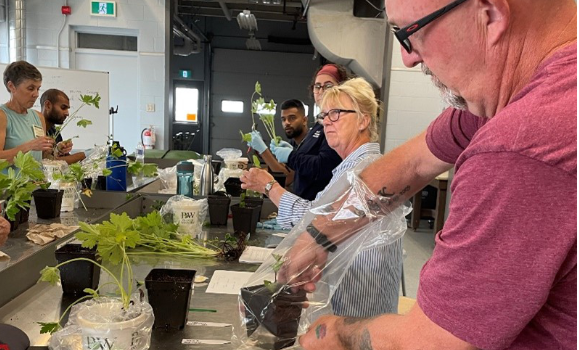As Andrew Lobo accepts his certificate of completion for Dal's Master Gardener Summer School, he reflects on his time spent learning and gardening at Dal’s Agricultural Campus in Truro.
“This was one of the best experiences of my life,” explains Andrew, who came from Mississauga, Ont. to participate in the Extended Learning program.
“My favourite thing about gardening is the feeling you get when you work hard and see the fruits of your labour, such as healthy plants and no weeds. I recommend anyone interested in getting real world experience in gardening to attend [summer school] in Truro if they have a chance.”
Master Gardener Summer School is a required component of the Atlantic-recognized Master Gardener program. The program provides training and experience to horticulture enthusiasts across the Atlantic region. Most provinces in Canada have a provincial, non-profit Master Gardener organization dedicated to providing educational and community support to their associates. All Master Gardeners must complete a recognized university horticultural study program and must meet ongoing continuing education requirements.
What it takes
Extended Learning supports nearly 300 Master Gardener students every year through the Atlantic, Ontario, and Alberta Master Gardener training programs. To become a certified Atlantic Master Gardener, learners must complete four online courses and the week-long summer school. Once certified, Master Gardeners must then continue their learning through volunteering, professional development, and continuing education each year.
For many students, summer school is the highlight of the Master Gardener program. It is offered annually each July and consists of five days of hands-on training in plant propagation, pruning, garden maintenance, tool use and maintenance, pests, and more. The goal of the program is to demonstrate and practice transferrable skills for growing and maintaining native, pollinator, and vegetable gardens.
For Maureen Bethel, summer school posed an exciting adventure to travel from her hometown of St. John’s, Newfoundland, to Dal's Truro campus. As a therapeutic horticultural practitioner and on her pathway to being a registered horticultural therapist, she says it was important for her to increase and improve her knowledge of botany for the everyday gardener.
“Summer school was only a week, but I learned many things and am grateful for the professors, teachers, volunteers, and classmates for their willingness to share knowledge, experiences, laughs and a love of gardening,” Maureen shares. “There were plenty of ‘aah moments.’ One was when using my secateurs [pruning tool] to flip them around to always have the cutting blade closest to the node. Another was I don’t line dance well, but I can do chair yoga!”

Students came from Nova Scotia, New Brunswick, P.E.I., Newfoundland, and Ontario for the experience.
Supporting communities
Master gardeners play an important role as volunteers across Canada helping to build resilient communities. They are diverse in their roles supporting community gardens, hospitals, elementary and high school programs, and beyond.
David Jarvis of Lunenburg, N.S., says he learned a lot through the program and has already passed on that knowledge in the hope that he can build a self-sufficient community and work towards defeating food poverty.
“I work full time attempting to combat food insecurity in my community through my Facebook group, We Feed Lunenburg,” David explains. “I grow as much food as I can for those in need and encourage others to do the same. For example, I gave away 400 vegetable and fruit transplants to those who think they could donate to the foodbank or the Lunenburg Community Food pantry we have created, and 50 plants to foodbank clients to grow their own food.”
Learners gain valuable horticulture knowledge through the Dal program, but most valuable of all may be the connections and friends they make. Master gardeners continue to stay in touch through their associations, virtual meetings, conferences, workshops, and more. Through this network and their continued learning, master gardeners continue to be just that — masters in their garden and an inspiration in their communities.

